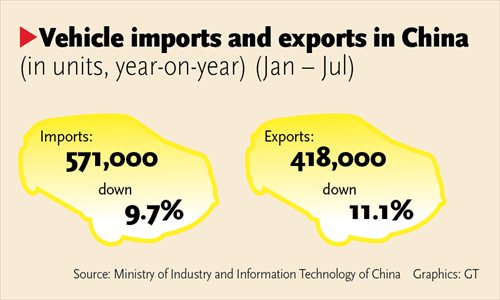
Graphics/GT
S Korean car brands losing competitiveness in China: expert
South Korea's auto giant Hyundai Motor Group agreed Tuesday to help troubled Chinese import dealers, and it said it is prepared to discuss specific compensation with every dealer, amid complaints from 30 dealers that Hyundai is not supplying cars to them.
A group of 30 Hyundai import dealers across China protested and demanded compensation for a second time at the Hyundai Motor Tower in -Beijing on Tuesday.
There was a protest in June by the same group, which accounts for 70 percent of the dealerships that handle imported Hyundai cars.
They complained that Hyundai was not taking orders or providing models in line with China's emission standards, meaning they had no cars to sell.
"We didn't stop exporting cars to Chinese dealers, but unexpected events and policies like the National V emission standard taking effect in April have interrupted our supply process," Wu Yanbing, manager of the marketing and strategy department of Hyundai Motor Group, told the Global Times on Tuesday.
The Ministry of Environmental Protection and Ministry of Industry and Information Technology (MIIT) announced in January that all imported, sold and registered light-duty gasoline vehicles, light diesel buses and heavy-duty diesel vehicles in 11 provinces and regions in China's eastern -regions should comply with the National V emission standard.
Given the new policy, old models can't be sold in regions including East China's Shandong, -Jiangsu and Fujian provinces, and it may take longer for dealers and customers to receive new cars, Wu explained.
"We are now actively communicating with these dealers and hope to settle the issue satisfactorily," he said.
Ongoing negotiations with every import dealer are being carried out secretly, according to Wang Rongzhen, head of the group which protested for compensation, and also owner of a dealership for Hyundai imported cars in Nantong, East China's Jiangsu Province.
"We hope there will be good results, but we will not stop protesting until the issue is solved," Wang told the Global Times on Tuesday.
On June 24, Hyundai publicly said it would pay compensation of 60 million yuan ($8.99 million) in total to the dealers, but import dealers are
dissatisfied with the plan as it is inadequate, Wang said.
A dealer from Ningbo, East China's Zhejiang Province, who only gave his surname as Tang, said he invested more than 20 million yuan in a showroom selling cars from Hyundai, but he is losing more than 500,000 yuan per month.
He said the South Korean automaker had not accepted import orders since the beginning of 2016 and thus he had almost no cars to sell. There were about 78 Hyundai dealers in China in 2012, but more than 30 dealers have closed, said Tang.
The country's slowing economic growth, strict emission standards and traffic control policies affect the development of the car industry, especially imported cars, Wu said, noting almost all foreign car brands face challenges.
In the first seven months of 2016, car imports stood at 571,000, sliding 9.7 percent year-on-year, data from the MIIT showed in September.
Beijing-based independent analyst Zhang Zhiyong said that it is normal that multinational companies export fewer cars to a foreign market while they increase cars manufactured in local plants, as the costs of the former mode are higher.
"Though the relative value of imported cars is dropping, the absolute value is on the rise," Zhang told the Global Times on Tuesday.
He said that traffic curbs only apply in some first-tier cities and slowing economic growth has few implications for residents' consumption -ability.
Rather, South Korean cars' competitiveness is declining due to the rise of Chinese car brands and other countries' cars, Zhang noted.
Sales of imported Hyundai cars dropped from 37,377 in 2011 to 7,063 in 2015, Wang said.


















































